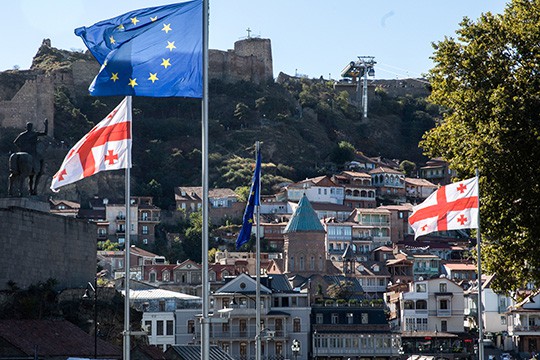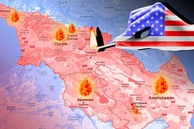In Georgia, there has been a growing confrontation between President Salome Zourabichvili and the ruling “Georgian Dream” party. Georgia’s Constitutional Court has started hearings on the impeachment of the president and is due to present its verdict to parliament in a month (1). The reason for impeachment proceedings is Zourabichvili’s recent foreign tour of European countries without consulting the government, which, in the opinion of the latter, violates the Constitution.
By setting out on a tour of EU countries for talks about Georgia’s membership in the EU Zourabichvili demonstrated independence which goes beyond her authority. Georgian Dream has also been presenting itself as a pro-European party. So, why is there a split rather than solidarity between two ideologically like-minded forces?
Because Georgia’s membership in the EU has in many respects turned into competitive rhetoric which, at present, is far from practicable. Brussels’ Georgian strategy is that the in June 2022 the European Council expressed readiness to grant Georgia the status of candidate for membership provided it met twelve conditions – secured deoligarchisation, improved media environment, guaranteed complete independence of the judiciary etc. There are too many conditions, many of the conditions will take years to put into practice, if they are practicable at all.
However, the generally pro-western tone set by the Georgian political establishment in the dialogue with voters does not allow any of the political forces to honestly acknowledge the full complexity of the process of joining the EU. Neither President Zourabichvili, nor the Georgian Dream, talk about the difficulties of following this path. Instead, either party is exploiting the issue for their own purposes, intending to gain the upper hand. On the whole, the EU is currently too busy to think about Georgia. Therefore, maintaining the high degree of expectation of the future membership in the EU in Georgia remains a hidden form of refusal. Juse like in the case with Turkey, for one.
Washington is playing its own game in Transcaucasia. For Georgia, it has the role of Bickford fuse for undermining regional stability with a view to oust Russia. Some of the facts to this effect have been published, such as a statement by the Georgian National Security Service, which reports about plans to carry out a coup similar to the Ukrainian “Euro Maidan” putting the blame for organizing it on the former Deputy Interior Minister of Georgia, currently Deputy Chief of Ukrainian Military Intelligence Georgy Lortkipanidze (2).
Members of a volunteer unit known as the “Georgian Legion” who are fighting on the side of Zelensky are to perform the function of militants of the Georgian “Euro Maidan”. In this respect, Speaker of Georgian Parliament Shalva Papuashvili has described Ukraine as a shelter for Georgian state criminals (3).
What is happening in Georgia fits into the overall strategy of the USA to reactivate local conflicts by the Russian borders and in the Russian interests zone in order to force Russia to scatter political, diplomatic and other resources, which, in the opinion of Washington, should weaken Russia’s positions in the conflict with Ukraine.
As part of this well-coordinated strategy there has come a request from Moldavian leaders to withdraw Russian peace-keepers from Trans-Dniester and replace them with a non-descript civilian mission; from Armenian leadership to withdraw Russian peace-keepers from Nagorno-Karabakh and replace them with European and American ones; there have been outbursts of tension in Syria, where the Russian contingent took part in government operations against the Islamists this summer; there has been a deterioration of the situation in Mali, where local law enforcers have been carrying out raids against terrorist gangs; and Afghan Taliban leaders have acknowledged that the USA is trying to induce them (even though unsuccessfully so far) to start a war against Iran, which will recoil on the security of Tajikistan and Turkmenia and may force Moscow to channel part of its diplomatic and military resources in this direction.
The potential organizers of a coup in Georgia are determined to re-kindle the flame of war in South Ossetia and Abkhazia, timing these events with the conflict in Karabakh. Georgia is needed as a stepping stone for American influence in the region, since neither Azerbaijan, nor Armenia can perform such a function in the conditions of conflict, the former because it looks to Turkey, the latter – because its leadership is only attempting to become such a base, dancing to the West.
The American Senators have drawn a bill on rendering military and humanitarian assistance to Yerevan and condemning violations of the rights and freedoms of Armenian population by Azerbaijani army. This testifies to Washington’s desire to flick Turkey on the nose for its excessively independent behavior and military and political cooperation with Azerbaijan without any consideration for the regional interests of the USA.
Georgia used to be part of the GUAM geopolitical bloc (Georgia-Ukraine-Azerbaijan- Moldavia), which was designed to counter-balance Russia’s integration efforts and served as an alternative to the EAEU project. GUAM could not compete in full with EAEU and was not supposed to. What it was expected to do was to impede the process of Eurasian integration both in the western and in the southern directions.
The last GUAM summit in Kyiv in 2017 focused on the opening of a free trade zone with countries of the Visegrad Group (Hungary, Poland, Slovakia, the Czech Republic) but this zone never appeared. The Visegrad Four itself is currently half-alive owing to Hungary’s unwillingness to participate in anti-Russian games and the possibility of a change of government in Slovakia following the results of the forthcoming parliamentary elections.
At present, GUAM exists on paper only. Its parts are separated by distance and by different views on what is happening worldwide. The closest cooperation is between Kyiv and Kishinev (Moldavia’s assistance in the transit of Ukrainian grain to Rumania etc.) Although the relations between Ukraine and Azerbaijan are pragmatic, we cannot signal the appearance of the geopolitical axis Kyiv – Baku, as each of the countries in question is concentrated on domestic problems.
In turn, relations between Ukraine and Georgia have cooled down considerably. The Georgian government sees Zourabichvili’s trips to Europe as an attempt to “have a quiet word” with foreign curators on Georgia’s potential place in a string of conflicts sparked by Washington in Eurasia. Fully aware of the economic and geopolitical fragility of the situation in the country, the Georgian Dream is trying to maintain peace in the republic and stability in Trans-Caucasia. And this is what Washington and its agents in the Georgian political establishment do not like about it.
The opinion of the author may not coincide with the position of the Editorial
- https://www.rbc.ru/politics/18/09/2023/65085f2c9a79474e424e8916
- https://1rodina.ru/article/v-gruzii-gotovitsya-perevorot-sledy-vedut-na-ukrainu
- https://sputnik-georgia.ru/20230918/ukraina-stala-ubezhischem-kriminalov---reaktsiya-na-zayavlenie-sgb-o-gosperevorote-v-gruzii-282388230.html
read more in our Telegram-channel https://t.me/The_International_Affairs

 10:34 28.09.2023 •
10:34 28.09.2023 •



























